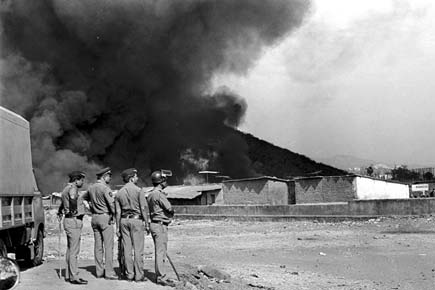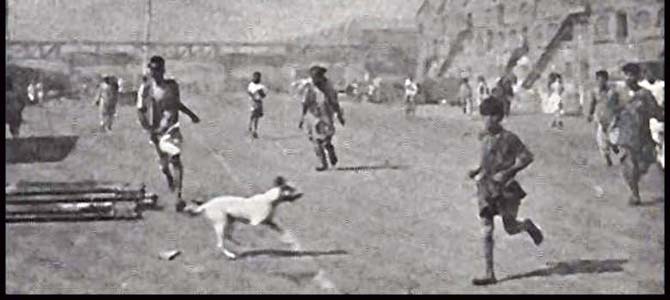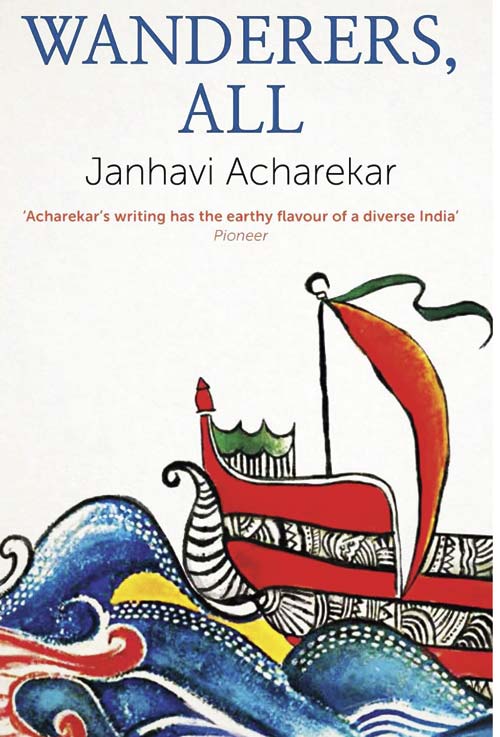Janhavi Acharekar’s novel Wanderers, All brings out the inner conflict and inadvertent drama that characterized Mumbai’s police in the early decades of the last century

Sometime in the mid-afternoon of April 14, 1944, two giant explosions shook the Victoria Dock of (erstwhile) Bombay when the British warship S S Fort Stikine, carrying cargo of cotton bales, gold, and tons of explosives, caught fire. The real-life tragedy, powerful enough to be caught by sensors in Shimla, is one of the defining backdrops in Janhavi Acharekar’s recently released novel, Wanderers, All.
Acharekar's fictional police hero, Bombay city Police Superintendent Raobahadur Murlidhar Khedekar, leads a cavalcade towards the docks engulfed in smoke and severed bodies. His police team aids the military, navy and fire personnel in containing the blaze of epic proportions.

Police had to quell the communal riots of 1992. They changed the character of the city, though
Trying to restore order in whatever conceivable way, Khedekar continues with the operation, braving scattered debris, fire-lit balls of cotton and gold biscuits spewing into the sky. His relentless pursuit of duty in this hour of crisis is a fascinating story.

The Victoria Docks explosion sends people scattering
That the story draws from the life and times of author Acharekar's great grandfather (who retired as the superintendent in 1944) makes the narrative relevant to Mumbai’s cultural past.
The protagonist’s varied interests like theatre, music, literature, bodybuilding, wrestling and surveillance, could have flourished only in a city that was home to immigrants of all hues. Fortunate to be placed in the city’s most active pre-Independence political years, Khedekar epitomizes the Mumbaikar whose identity is shaped by cultural forces that made the Mumbai of those times.
Wanderers, All is a mirror of Mumbai’s evolution. But it has a special relevance to today’s Mumbaikar, as it portrays a colonial police force (led by the British) which deals with social conflicts and tensions that ring true in the contemporary context. The deliberations between Indian and British officers over the appropriateness of “riot response” and “riot prevention” (during the coinciding Ganpati and Muharram festivals) in “sensitive areas” is utterly identifiable.
And so is Murlidhar Khedekar’s tea meeting with Ulema and Hindu priests to “celebrate the success of the communal experiment.” The festive season dilemmas faced by the police in Wanderers, All bring out the irony of administering a city that is secular and ripe-with-communal-tensions at the same time.
In disguise
The juiciest part of Wanderers, All comes in the form of the colourful assignments that protagonist Murlidhar Khedekar takes on. Much on the lines of the real-life maverick British officer Charles Forjett, who modernized the force and introduced resourceful criminal intelligence-gathering techniques, the fictional Khedekar introduces the green room or disguise room in his office.
Disguised as a Pathan or as an opium addict, he wanders in the city to gather information about crime suspects. For someone who had once visualized himself doing the lead roles in Marathi musicals (particularly charged after a conversation with veteran playwright like Govind Ballal Deval) these were treasured moments of performance and ‘dress rehearsal.’
Enamoured by the art of role-playing, Khedekar trains his junior police officers in conducting “nocturnal excursions” in the city’s gambling dens. Khedekar’s escapades indicate the dark underbelly of Mumbai which has been a perennial subject of concern for the police force. At the same time, his personality goes close to the friendly daroga persona that found a reflection in popular Bollywood culture.
The protagonist Khedekar provides legitimate space for “strange dresses, diverse headgear, hilarious wigs and bizarre disguises” in the CID cabinets. That reminds us of the Hindi film cops of that era who took unsuspecting criminals by surprise. Not to forget the fancy turbans and sprawling beards which played a key role in the surveillance strategies.
Theatre, rather unintended drama, is the hallmark of Khedekar's narrative. As an Indian police officer leading a British force in the time of a fervent freedom struggle, Khedekar was entrusted with special responsibilities of assessing the mood of the moment, which required language skills. He had to scan the scripts of plays to be performed in the city and often preview the staged versions to detect hidden anti-British messages. His work therefore involved chance meetings with theatre greats.
One memorable one with dramatist Mama Warerkar is engaging. Moreover, the plays he previewed enriched him with insights into human behaviour. For instance, the iconic play Ekach Pyala (the story of a liquor addict) helped him empathize with subordinate constables who took to compulsive drinking. Khedekar triumphed in bringing the attention of the British higher-ups towards the debt-ridden, overworked and underpaid constabulary. He was successful in convincing the force to upgrade their salaries and to galvanize their appraisal system.
Turmoil Within
A lot of drama in Wanderers, All emanates from Khedekar’s inner conflict. The best example of the ‘drama within’ showed in his decision to name his son Swaraj. The name meant self-rule and independence; it was the unlikeliest name for the son of a duty-bound officer who served the British Empire. The name causes much confusion in Khedekar’s life and leads to unintended humour.
On social occasions, which involved after-hours mingling with British officers and their families, the name was instantly shortened to an innocent ‘Raj.’ Khedekar’s home was no less than any theatre space, thanks to his otherwise-docile wife who strongly stood for national leaders like Tilak and Gandhi at dinnertime. Although confined to her kitchen base, aided with no reference assistance, she was a fierce advocate of Swadeshi values, which silenced the otherwise commanding Khedekar.

Khedekar’s retirement from the city police force is a poignant moment, especially because he feels relieved of the dread and guilt of “being duty-bound to rein in the upholders of the nation's future.” This is the point where Wanderers, All gains in depth. Khedekar confesses, to himself, about his divided loyalty. He feels that he cannot possibly be loyal to a force that negates the concept of a free India. At this point, the book also encourages the reader to rethink the oft-used and glossed-over terms like freedom, self-rule and independence.
Sumedha Raikar-Mhatre is a Mumbai-based culture chronicler.
 Subscribe today by clicking the link and stay updated with the latest news!" Click here!
Subscribe today by clicking the link and stay updated with the latest news!" Click here!







